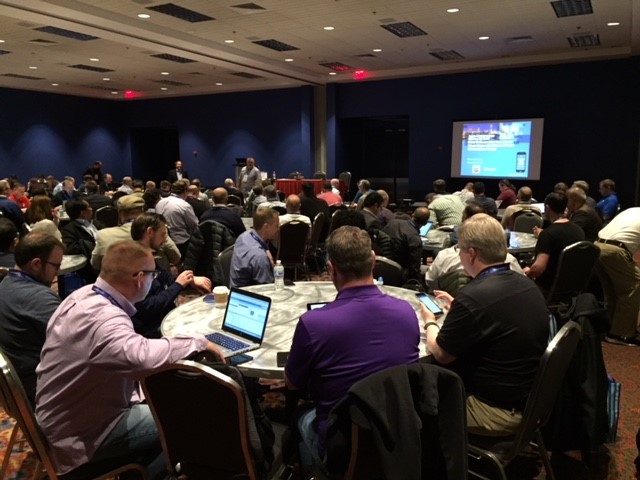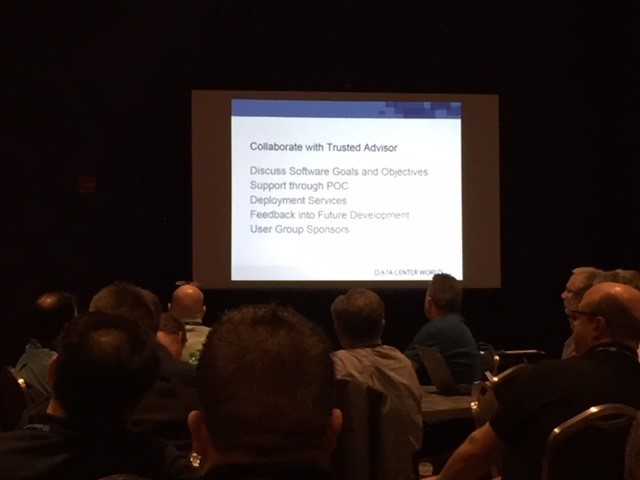
With more organizations on their second rounds of Data Center Infrastructure Management (DCIM) software, it’s more important than ever for data center professionals to ensure that the data center management solution they select is the correct one. But how do you avoid buyer’s remorse when choosing and deploying B2B technology like DCIM software? How do you avoid major pitfalls and obstacles that can derail the implementation? And what are the must-have capabilities that you should look for in a DCIM software solution?
These questions and others are difficult to answer without significant experience with buying, implementing, and using DCIM software in a real-world environment. That’s why Sunbird was thrilled to present with our customer Chevron at this year’s Data Center World Global in San Antonio.
Titled “DCIM Software Five Years Later: What I Wish I Knew When I Started,” the presentation featured Steve Lancaster, Data Center Assets Facilities Lead at Chevron. During the presentation, Lancaster shared his knowledge gained and lessons learned from using Sunbird’s DCIM software with Raritan® intelligent rack PDUs to successfully optimize Chevron’s 1800+ rack data center environment and to make smarter data center management decisions. Lancaster has more than 18 years of experience managing data centers and providing IT support and was responsible for developing Chevron’s San Antonio data center from the ground floor into an enterprise level, highly redundant modern data center.

Wondering what you missed? Check out Lancaster’s slides below, or continue reading for key takeaways.
3 Keys to DCIM Software Success
Based on Lancaster’s presentation, here are three keys to successfully buying and implementing DCIM software:
1. Understand Your DCIM Software Goals and Make Sure the Product Aligns with Them
To avoid buyer’s remorse and choose the right software, it’s critical to understand your goals and objectives. From there, you can narrow down vendor products, make sure you have a deep understanding of solution capabilities, review ease of use and vendor support, and perform a Proof of Concept (POC).
In Chevron’s case, the company’s usage requirements were outpacing the capacity of its seven existing data centers, so they had to build a new data center in San Antonio. Additionally, the company was using spreadsheets and Visio to manage their data centers, and they had to contend with limited visibility into their assets and available space capacity. Lancaster and Chevron were looking for a complete solution to enable remote management of assets across sites, alignment of space, power, and cooling with business lines, data monitoring to inform capacity management, and inventory reports to simplify inventory management and auditing.
“A new data center build is a good time to move off spreadsheets,” said Lancaster.
2. Avoid Major Obstacles and Pitfalls with a Deployment Plan
Careful planning your DCIM software deployment with your team (and sticking to the plan) can help to ensure its success.
As part of your deployment plan, Lancaster recommends hands-on training with your selected vendor on with the necessary team members. Minimizing head count will help you ensure resource availability while making sure the appropriate team members are trained on the DCIM software and can see how their most common tasks become easier. Also, you can save time and effort by making sure that you are using clean, high-quality data and following data governance best practices.
3. Collaborate with a Trusted Advisor
Buying DCIM software is a long-term investment, so it’s important that your vendor is a trusted advisor as well.
In addition to hands-on training, you should expect to discuss your short- and long-term software goals and objectives with your vendor. Look for someone who provides strong support during the POC process. Additionally, your vendor should solicit your feedback as part of the product development process via user groups so that you can ensure that the software meets your future needs as well.

Selecting the right data center management solution can be a lengthy, stressful process. However, once you’ve made your choice, you’ll find that DCIM software is a critical tool to help you get the information you need to answer your most common data center management questions. Lancaster’s real-world advice can help you avoid buyer’s remorse and build a trusted relationship with your vendor to help you ensure DCIM software success now and in the future.
“When you have large data centers with large amounts of data to maintain, update and verify, you need the ability to clearly see timely and accurate data and the linkages between all the pieces of data so you can make data-based decisions quickly,” said Lancaster.
Want a taste of Chevron’s DCIM software success? Take a test drive today and experience for yourself second-generation DCIM software that is fast, easy, and complete.




























